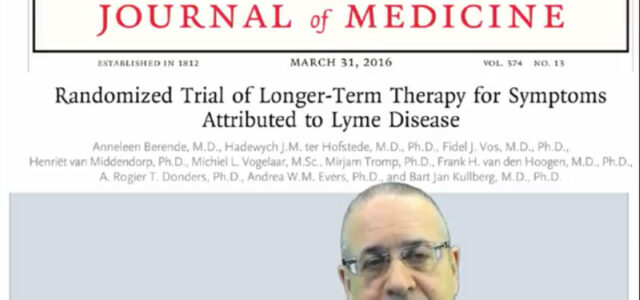
by Daniel J. Cameron, MD MPH
In the article, Randomized Trial of Longer-term Antibiotic Therapy for Symptoms Attributed to Lyme Disease, the authors “assessed whether longer-term antibiotic treatment of persistent symptoms attributed to Lyme disease leads to better outcomes than does shorter-term treatment.” They report that “longer-term antibiotic treatment did not have additional beneficial effects on health-related quality of life beyond those with shorter-term treatment” in patients with persistent symptoms.
The Netherlands trial included 281 Lyme disease patients, with a mean age of 43 to 48 years. The average duration of symptoms was 2.7 years. There was a median of 2 previous treatments. And patients had an average of 30 days of treatment prior to enrolling in the trial.
This video, produced by the New England Journal of Medicine, describes the clinical trial results.
The erythema migrans (EM) rash was present in 27% of the patients, 29% had a positive IgM Western blot, and 64% had a positive IgG Western blot. The symptoms attributable to Lyme disease were arthralgia, musculoskeletal pain, sensory disturbance, neuralgia , neurocognitive symptoms, and fatigue.
The authors imply that 2 weeks is as effective as 14 weeks of antibiotic treatment. However, when reviewed in-depth, it is clear that neither short- nor long-term therapy restored the patients’ health. All Things Lyme video blog takes a closer look at the Netherlands clinical trial.
The Lyme patients’ quality of life was assessed on the SF-36 physical component of Health (PCS). Based on a PCS score, the Lyme disease patients’ quality of life was worse than that of a diabetic and cancer patient. The PCS for the patients enrolled in the Netherlands trial was 31 to 32. The PCS for diabetes and cancer was 42 and 41 respectively. The norm for the general population was 50.
The Netherlands study demonstrated that both short- and long-term therapy failed for this cohort of patients. There are several reasons why this may have been the case:
- Retreatment delays of 2.7 years
- Enrolled Lyme disease patients had failed 2 previous treatments
- Poor quality of life on enrollment
- No evaluation for co-infections (e.g. Babesia)
When patients have persistent symptoms of Lyme disease, there are several treatment options to consider:
- Longer initial treatment (e.g., more than the 2 weeks of IV in this trial)
- Earlier retreatment (e.g., not 2.7 years)
- Evaluation for co-infections (e.g., Babesia)
- Consider individualized therapy until the quality of life returns to normal (e.g., PCS score)


